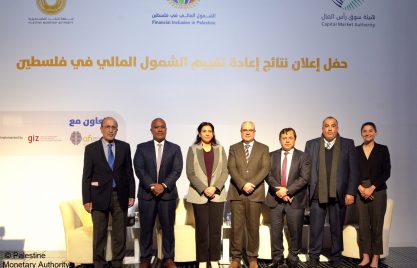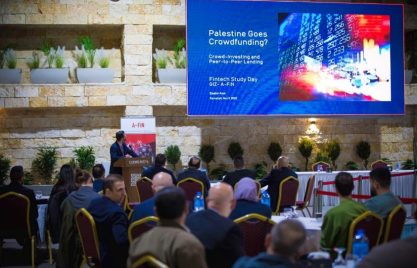Studying a remarkable success story of consumer counselling, a delegation of the Palestine Monetary Authority visits Bosnia and Herzegovina as part of the larger project on enhancing the services of the PMA’s consumer relations halls.
“Most important is creating trust to the client. Other success factors are expertise and neutrality”, explains Andrej Dizdarević, consumer advisor for clients of financial institutions at the Stari Grad Municipality in Sarajevo. 28 municipalities in Bosnia&Herzegovina are offering free-of-charge and neutral information about financial products, educate clients on the Do’s and Don’ts in dealing with financial institutions, and help out with practical advice on how to manage the own debt and household expenses. This and the broad experience of the Bosnian authorities, Central Bank and financial institutions in crisis management after an overindebtedness crisis hit the country in 2008, led the Palestine Monetary Authority to send 3 delegates to Sarajevo for a 3-day study visit about consumer counselling and the management of an overindebtedness crisis.
In the core of the challenges, as Ali Faroun, Director of the PMA’s Market Conduct Department points out, is both the limited financial literacy of many clients and guarantors of loans in Palestine, but also the fact that informal finance is known to play a big role. The Palestinian delegation finds similar challenges in the young history of the Bosnian financial system. Back in 2008, a credit bubble burst after irresponsible lending practices, a limited consumer protection regime and low financial literacy. In reaction, the Bosnian microfinance institutions, with support of international partners, founded the association “Plus” and started to offer financial education services and problem mitigation counselling for clients of financial institutions. Today, the Association “Plus” works closely with the Central Bank of Bosnia and Herzegovina, and has been involved in consumer counselling, financial education and teaching other consumer advisors, most of them on municipal level, on how to approach consumers in trouble with high quality advice. Close cooperation is also maintained with key regulatory bodies in the financial sector, such as the banking agencies and the Office of the Ombudsperson for the Banking System.
The Palestinian delegation had an opportunity for an intense peer exchange between their consumer relations halls advisors and the Bosnian counterparts. The PMA’s intention is to act now in order to prevent any crisis, and received valuable advice and insights into the Bosnian system and experience.
The study visit took place between 18th and 20th of July and was supported by the MFMR programme and the Sanad Fund for MSME Technical Assistance Facility.
By Thomas Rahn



